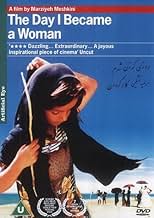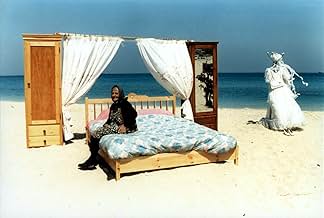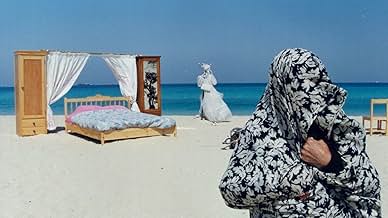NOTE IMDb
7,3/10
2,1 k
MA NOTE
Ajouter une intrigue dans votre langueThree linked stories show women at life's crossroads: a girl's 9th birthday, a cycling race, and an elderly woman's dream of buying long-desired items.Three linked stories show women at life's crossroads: a girl's 9th birthday, a cycling race, and an elderly woman's dream of buying long-desired items.Three linked stories show women at life's crossroads: a girl's 9th birthday, a cycling race, and an elderly woman's dream of buying long-desired items.
- Réalisation
- Scénario
- Casting principal
- Récompenses
- 10 victoires et 5 nominations au total
Avis à la une
10jakub66
Having followed Iranian cinema for a while I didn't think I was in for a surprise but Meshkini (director) managed to blow me away with the minimalist approach to depicting the fundamental issues of Iranian society. The elegance, minimalism and eloquence of this picture manage to depict the role of a woman in Iran with painful clarity.
"Roozi khe zan shodam" is an essential and defining piece of cinema.
"Roozi khe zan shodam" is an essential and defining piece of cinema.
I saw "Roozi khe zan shodam" ("The Day I Became a Woman") a few days ago during the Memorial Day holiday. It was a good film with strong, subtle acting and quite interesting camera shots.
In a nutshell, the film is about women in contemporary Iran. It depicts compelling accounts about a girl who has just turned nine and is now therefore considered to be a woman and expected to leave childhood play behind; a woman's bicycle race and the strong objection a husband has to his wife's participation; and an elderly woman who has in earlier life deferred her desires to buy consumer goods and finally has the opportunity to realize her spending dreams.
Without having lived in or even visited Iran, I can't judge the realism of "Roozi khe zan shodam". The camera offers us an innocent, child-like eye, just observing these characters and leaving us to draw our own conclusions. I particularly enjoyed the cinematography of the mass of women cyclists, all clad in black practically head to foot, pedaling away almost entirely in silence except for the rhythmic pedaling noises; and the parallel shots focusing on the legs of the galloping horses, carrying the complaining husband and his cohorts. The pedaling wife Ahoo (Shabnam Tolui) never speaks a word, but her focused and desperate efforts indicate her quest for increased independence. I also enjoyed following the activities of 9-year-old Hava (Fatemeh Cherag Akhar).
I would see "Roozi khe zan shodam" again for its cinematography and the unique (at least for Western audiences) life experiences depicted. It's by no means Hollywood fare or even overtly feminist, but allows the viewer to settle in for a bit of (realistic or stylized?) local color and look at perspectives there of women in three different stages in their lives.
In a nutshell, the film is about women in contemporary Iran. It depicts compelling accounts about a girl who has just turned nine and is now therefore considered to be a woman and expected to leave childhood play behind; a woman's bicycle race and the strong objection a husband has to his wife's participation; and an elderly woman who has in earlier life deferred her desires to buy consumer goods and finally has the opportunity to realize her spending dreams.
Without having lived in or even visited Iran, I can't judge the realism of "Roozi khe zan shodam". The camera offers us an innocent, child-like eye, just observing these characters and leaving us to draw our own conclusions. I particularly enjoyed the cinematography of the mass of women cyclists, all clad in black practically head to foot, pedaling away almost entirely in silence except for the rhythmic pedaling noises; and the parallel shots focusing on the legs of the galloping horses, carrying the complaining husband and his cohorts. The pedaling wife Ahoo (Shabnam Tolui) never speaks a word, but her focused and desperate efforts indicate her quest for increased independence. I also enjoyed following the activities of 9-year-old Hava (Fatemeh Cherag Akhar).
I would see "Roozi khe zan shodam" again for its cinematography and the unique (at least for Western audiences) life experiences depicted. It's by no means Hollywood fare or even overtly feminist, but allows the viewer to settle in for a bit of (realistic or stylized?) local color and look at perspectives there of women in three different stages in their lives.
I felt the need to defend this film as I don't believe it deserves the above rant. It is true that we are not given many details about the three characters whose stories are presented. But we are given enough to feel sympathy for the girl whose childhood is over, the woman who just wants to be allowed to ride her bike, and the woman who was finally able to buy the things she's always wanted. The English title evokes an expectation that each of these stories represents a transition.
As a woman, it sometimes occurs to me to wonder what that means exactly. This film explores the fact of being a woman and what it means to become one. Was Hoora not a woman before today? We are left to imagine what her life was like before and what brought her to this circumstance, but clearly these details are not so important.
This film is an exploration, not a documentary. It is beautiful and bittersweet (and personally I liked the music) It is not Hollywood by any standard but it is not complicated and even to a Westerner like me it held a lot of truth. It's purpose can be as much to explore one's own views as those of the Iranian filmmaker, and should be viewed as a piece of art rather than a mainstream American movie. Give it a chance, it's only 74 minutes.
As a woman, it sometimes occurs to me to wonder what that means exactly. This film explores the fact of being a woman and what it means to become one. Was Hoora not a woman before today? We are left to imagine what her life was like before and what brought her to this circumstance, but clearly these details are not so important.
This film is an exploration, not a documentary. It is beautiful and bittersweet (and personally I liked the music) It is not Hollywood by any standard but it is not complicated and even to a Westerner like me it held a lot of truth. It's purpose can be as much to explore one's own views as those of the Iranian filmmaker, and should be viewed as a piece of art rather than a mainstream American movie. Give it a chance, it's only 74 minutes.
This is a beautifully shot, richly textured film. Its decidedly surrealist elements do not detract from its poignant central message: that the arbitrary social conventions which govern womens' lives in Iran are inherently absurd. What is so striking about this film is the way in which the director brings out this element of absurdity by transplanting an Iranian narrative onto the bizarre setting of Kish Island, a free trade zone and resort off the coast of Iran. The women in the film are all forced to play out the roles assigned for them by Iranian society, despite the virtual absence of the state, which is so often demonized in treatments of Iranian women's lives.
I saw this gem of a film a few months ago and it has lived with me ever since. There are lots of great things to talk about but I will only mention a few. I liked the striking images of the sea and the shore and the manner in which they are imbued with great meaning. The sea - which represents adventure, sensuality, fluidity, freedom and sex - is a constant motif throughout the film and is a joy to look at. I also liked the structure - reminiscent of Hemingway's short stories - where characters from one story seem to reappear in others.
But though connected through theme and also through the plot, the individual films retain a great level of distinctiveness. For instance, the second film remains unresolved at the end and the discussion of the two fellow riders in the third movie only have the effect of heightening that suspense. On the other hand, the third film has the effect of satisfactorily and unexpectedly wrapping up the first film: whereas the girl in the first film was denied the chance to enjoy the sea (and everything it represents), the old woman in the third film takes her revenge by completely inverting tradition. The image of the old woman and those motifs of domesticity being carried away on the sea is unusual but also funny. In putting not only herself but also her whole house on the sea, the old woman has inverted tradition and has the ultimate revenge.
But though connected through theme and also through the plot, the individual films retain a great level of distinctiveness. For instance, the second film remains unresolved at the end and the discussion of the two fellow riders in the third movie only have the effect of heightening that suspense. On the other hand, the third film has the effect of satisfactorily and unexpectedly wrapping up the first film: whereas the girl in the first film was denied the chance to enjoy the sea (and everything it represents), the old woman in the third film takes her revenge by completely inverting tradition. The image of the old woman and those motifs of domesticity being carried away on the sea is unusual but also funny. In putting not only herself but also her whole house on the sea, the old woman has inverted tradition and has the ultimate revenge.
Le saviez-vous
- AnecdotesMarzieh Makhmalbaf's directorial film debut.
- GaffesIn the first sequence, the lollipop that Hava and Hassan pass between them grows and shrinks in size without regard to the passage of time.
- Citations
Grandmother: Will you promise to be back by noon?
Hava: I promise!
Grandmother: God won't forgive you if you lie. Don't be late.
- ConnexionsFeatured in Women Make Film: A New Road Movie Through Cinema (2018)
Meilleurs choix
Connectez-vous pour évaluer et suivre la liste de favoris afin de recevoir des recommandations personnalisées
Détails
- Date de sortie
- Pays d’origine
- Sites officiels
- Langue
- Aussi connu sous le nom de
- The Day I Became a Woman
- Lieux de tournage
- Kish Island, Iran(location)
- Sociétés de production
- Voir plus de crédits d'entreprise sur IMDbPro
Box-office
- Budget
- 180 000 $US (estimé)
- Montant brut aux États-Unis et au Canada
- 149 971 $US
- Week-end de sortie aux États-Unis et au Canada
- 48 255 $US
- 8 avr. 2001
- Montant brut mondial
- 149 971 $US
Contribuer à cette page
Suggérer une modification ou ajouter du contenu manquant



















